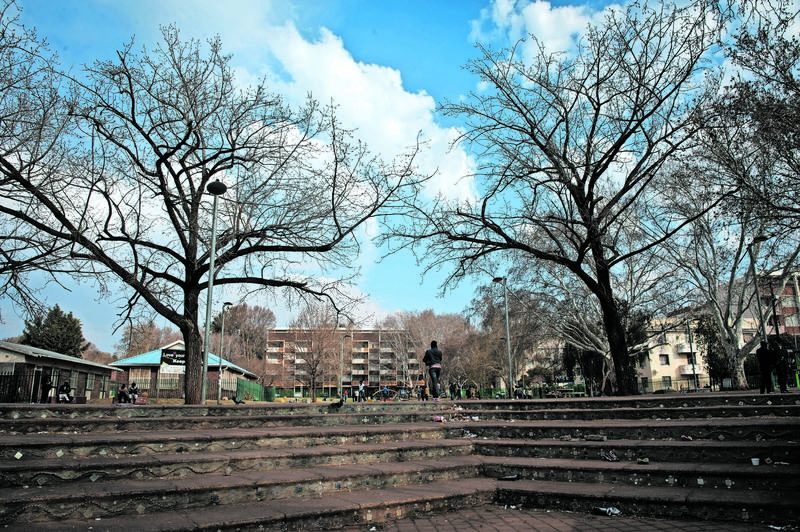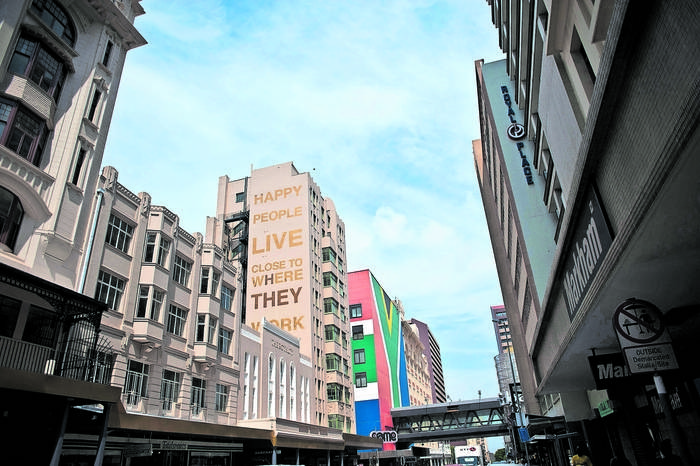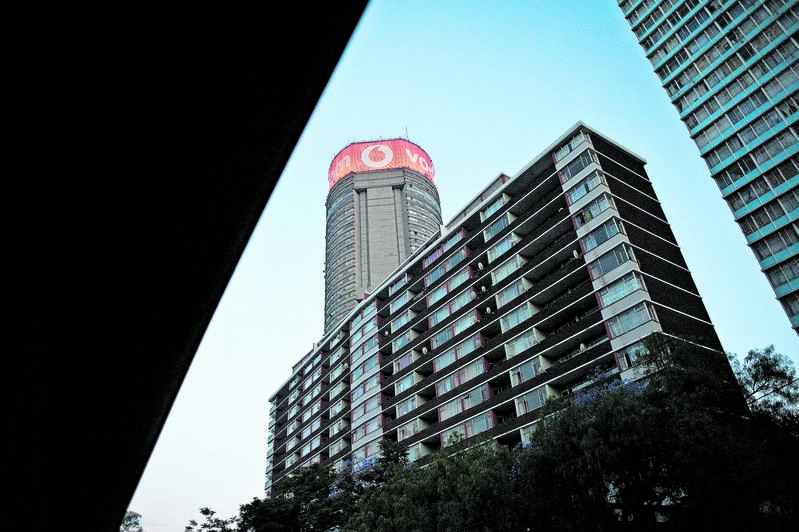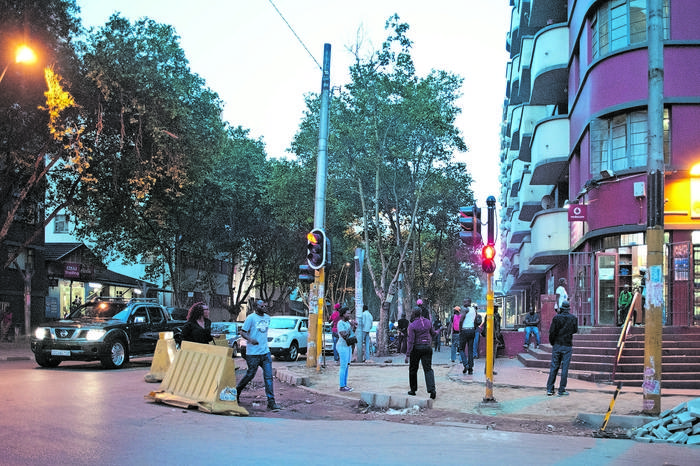
Intimate city: Niq Mhlongo’s new novel about Mangi and his fiancée Aza is set in Joburg. (Delwyn Verasamy/M&G)
The bright morning sun slid gradually over the high iron gate of the Ellis Park Stadium to throw narrow patterns of parallel shadows onto the ground before it. The Joburg heat filled the air in all its intensity.
The breeze which had sprung up in the morning had died away like a ghost returning to the grave. As the sun burned down, sweat stung my eyes and I wiped it away on my shirt sleeves. At the corner of Beit and Nugget Street a homeless person stood at the faulty traffic lights with a board that said: “LET’S DO LUNCH, YOU BUY, WE EAT.” His dirty shoes were falling apart and attached to his ankle with a dark string.
I smiled at the man before spending a moment exchanging banalities with him. His face radiated joy and he had a cataracted eye.
“My brother, how is life?” I asked.
“It only takes time, but in the end it will come together, my brother.”
“Heita daar.”
As he smiled at me, rivulets of sweat ran down my back, and my shirt clung to my skin. Before the traffic light, a motorist dropped a cigarette he was smoking on the ground. It lay burning faintly. The homeless man ran towards it, picked it up, and smoked whatever was left of it.
“We shall survive, my brother,” he said to me. “Life has no plot while we are still living. Surviving means being born and reborn over and over again.”
“That’s the word,” I said as I left him.
In front of me the city looked happy and loud, although there were signs of dirt, neglect, decay and ageing infrastructure everywhere. Nostalgia hit me as I crossed the railway line separating Hillbrow and the CBD. A black rubbish bag sailed from the train bridge onto the line below from a hawker, and it burst up, scattering rubbish between the disused railway lines. Big fat rats scattered and then regrouped before foraging the teared bag.
The deeper I penetrated the city, the more diverse the population. I strolled down the congested De Villiers Street, crossed Claim and towards the MTN Noord Taxi Rank. I became acutely aware of the rubbish on the street. The streets were filled with a world of languages. There were working men and thieves of various kinds. As I walked slowly, I might have heard all eleven South African languages and more than a dozen languages that I could not understand. In front of me a young homeless man walked round the edge of a pile of rubbish. The oversized dirty T-shirt that he was wearing made him look even thinner than he was.
At Klein Street I turned to the right into Wolmarans Street, passed the now-neglected Johannesburg Art Gallery building into Joubert Park. The July wind stirred up the black plastic bags before they got trapped by the fence next to the gallery. I couldn’t help but move my jaw several times at the smell of the braai meat and at the sight of the flowing coffee at the shop next to the taxi rank. I sat on the pavement for several minutes catching my breath before I could get to my feet.


I wandered through Wanderers Street, enjoying the odd mix of feelings of nostalgia that showed their shadows, then vanished again in my mind.
The city looked like it had changed a lot since I’d last walked its streets. There was no sign that it was once a city of gold. All I saw and smelled was rubbish everywhere, fake goods sold on the pavement, peanut shells, an odour of urine in the alleys, broken bottles, roasted and boiled mielies, squashed banana, mango pips, and dirty plastic bags thrown everywhere.
Every building I looked at was old and neglected as if screaming out for a coat of paint. I slowed my pace and read the names of different shops like God’s Paradise, Sweet Waters and Hollywood Guests. The smell of fish and chips frying wafted through the crowded street. It reminded me of my early days when I’d come to this city to be a student at the university, and how new and enticing everything about the city was.
Time was passing with unbearable slowness. I sat down on the bench at the Joubert Park and watched people play chess using the huge chess pieces and the floor chess board. The person I rooted for to win was an unkempt, agitated man who appeared to be around fifty. He had a bush-like grey beard and hair. The way he posed before he moved his pieces triggered a flood of distant memories and emotions in me. His opponent was lightskinned with a pallid complexion. The front of his head was bald, whereas the back sprouted a thick tuft of hair. He’d bury his fists in his armpits before he made a move. He would then start biting his lower lip quite hard when he sensed that he had made a costly move. Small drops of sweat travelled down from his forehead and he didn’t wipe them away.
 Intimate city: Niq Mhlongo’s new novel about Mangi
and his fiancée Aza is set in Joburg. (Delwyn Verasamy/M&G)
Intimate city: Niq Mhlongo’s new novel about Mangi
and his fiancée Aza is set in Joburg. (Delwyn Verasamy/M&G)The sombre thoughts that had blinded me seemed to have vanished as I watched them play. I used to come to this place years ago when the park was clean and safe. I would sit in the same spot and watch people play chess, which was also one of my hobbies.
Today, the park looked like a no-go area, especially at night. It was inhabited by thieves, prostitutes and druggies who had populated the city. I was astounded by how old I felt. All those memories that were re-emerging from my past seemed to be shaping my present. My dirty beard, Joubert Park, the nearby Wanderers Taxi Rank, Park Station, the flats — they all created a vast emotional distance on which I could look back, and from time to time I murmured with my eyes half-closed.
Joburg City used to be my home. It had taught me a number of survival skills ever since I got mugged in this city a few years ago. Walking in Joburg City Centre was like carrying my death on my shoulders. One must always watch out for pickpockets, cell phone and bag snatchers. Always pretend you belong to the city. Since the day I was mugged,
I had not reconciled with this city.
I had an ongoing abusive relationship with Joburg, just like with Aza. As I continued walking, I became extra cautious. Today, Joburg streets are yours; tomorrow, there’s no guarantee. That’s how disfigured this city was. It had been taken advantage of by tsotsis and like its neglected drug-addicted street kids, it has never regained its soul.
It was in the city that I met Aza and fell in love with her. For eight years until now, she had constituted my whole universe and together we had become ourselves. But ever since I got mugged, I look at this city with great suspicion, just like Aza. I had come face to face with its reality, its mental, physical and emotional poverty. No doubt, this city had turned me into a stranger, a foreigner in what used to be my own home.
The City Is Mine is published by Kwela Books.
 (1).png)
 8 months ago
46
8 months ago
46


















